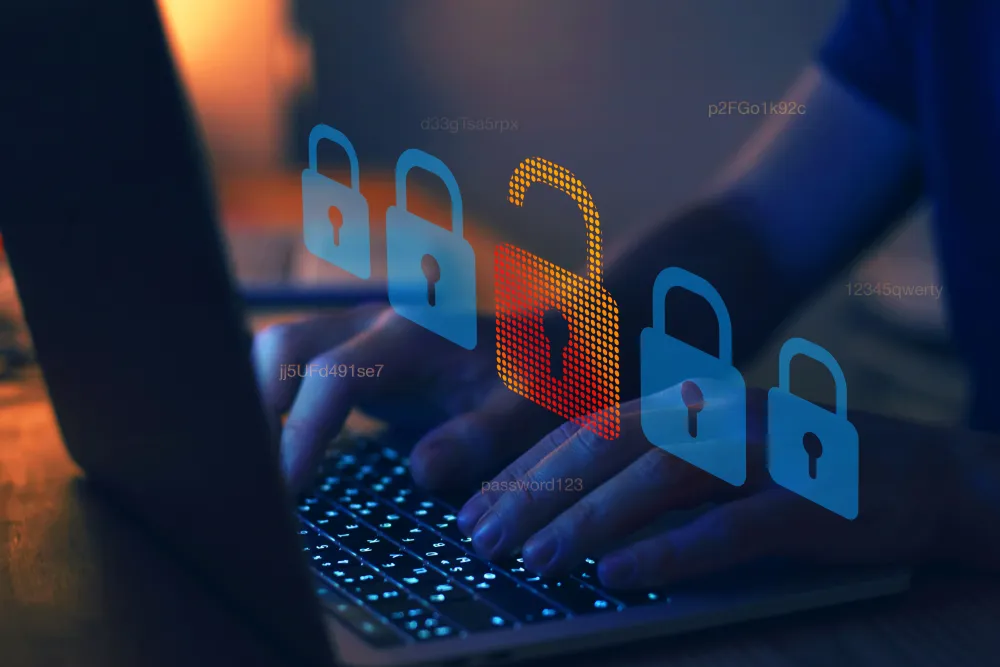
Laptop showing a cyber attack.
How to Protect Your Personal Data from Cybercriminals Easily
Data is a hot commodity for legitimate businesses like data brokers and criminals who ransom or sell it on the dark web. There’s probably info about you out there you aren’t aware of. Even more could be exposed via careless behavior or improper storage. Want to do something about it? Then follow our guide & take back control!
The best defense is being proactive
There’s nothing you can do about incidents like data breaches other than hope the companies that have your data have adequate cybersecurity. That doesn't mean you're helpless! By proactively securing your data, you can minimize the damage, even if preventing an attack is beyond your control.
Being proactive means assuming you’re at risk and putting up strong digital defenses before such suspicions become reality. All of this might sound scary at first, but taking charge of your online safety is empowering. It's not that hard, either! Here are a few habits to get into that will help lower your online footprint and help safeguard your data.
Learn to recognize phishing attempts
Knowledge is the first and best weapon in your arsenal. Cyber crooks often don’t need to hack into systems or networks to get at someone’s files. Not if they can get them to spill the beans on their credentials. They do this through phishing scams, posing as someone in authority or whom the person trusts.
It's not your typical ‘Nigerian prince’ scam. They can use publically available info on you to craft convincing emails with logical-sounding calls to action that are hard to resist. Learning how to spot such emails and avoid clicking on attachments or links is already more than many carefree netizens do.
Keep a low-key social media presence
Oversharing on social media is among the most common sources of data compromise. You don't need to turn into a hermit, but you should think twice about what you post or which activities you engage with from now on. We're not just talking about being wary of curious strangers, either.
It's common for companies to collect data on people who visit their pages through surveys & questionnaires. While finding out which Pokemon is your inner spirit animal is tempting, it’s also a way for third parties to gather data on your interests, habits, and beliefs. You almost always have to provide contact info to get the results. If that info package you gave away becomes part of a data breach, the perps will have plenty to go on.
Stay Away from Public Wi-Fi
Free Wi-Fi is everywhere, and we use it liberally without knowing the dangers. Random Wi-Fi connections are notoriously easy to tap. That means someone with basic hacking know-how can track what you're doing and record your keystrokes, exposing passwords, CC numbers, or private conversations.
Keep your OS, programs, and apps updated
An unpatched device is wide open to exploits, hacks, and other attacks. Luckily, all you need to do is make sure automatic updates are on all of them. Having current versions of everything from your operating system to your favorite time sink mobile game keeps most attacks at bay.
Which Cybersecurity Tools Should You Use?
Adopting proactive cybersecurity habits goes a long way. Still, it can't protect you from everything. That's where a strong cybersecurity suite comes in. Here’s what you’ll need.
Cloud storage
Hard drives die, and laptops get stolen, leaving you without crucial files if you don't maintain backups. The easiest and safest way to do this is via cloud storage. Depending on the plan, you can get an always-online vault with room for terabytes of files.
You can access them from any device, regardless of location. More importantly, sophisticated encryption ensures anyone who might try to intercept files stored in the cloud only ends up with gibberish.
A password manager & 2FA
Passwords are among the most common data exposed through breaches. Careless users will reuse one outright or with small changes for many accounts, so losing just one password can land them in a world of hurt. Password managers take seconds to create long and unique passwords for any account. They might look like gibberish, yet such passwords are almost impossible to crack.
Better managers also integrate two-factor authentication. It protects your accounts by insisting on authentication from another source, usually a code sent to your phone. That gives you a chance to reset a password and recover an account even if it’s compromised.
A VPN
VPNs offer comprehensive encrypted protection for your entire connection. They use servers the world over and make it look like you're connecting from one of them. This lets you maintain privacy, protect your data, and access content otherwise locked by geo-restrictions. There are even more VPN uses you might find interesting. But safety while surfing the internet is the primary one.
Further reading: Cyberattacks Are a Costly Business

